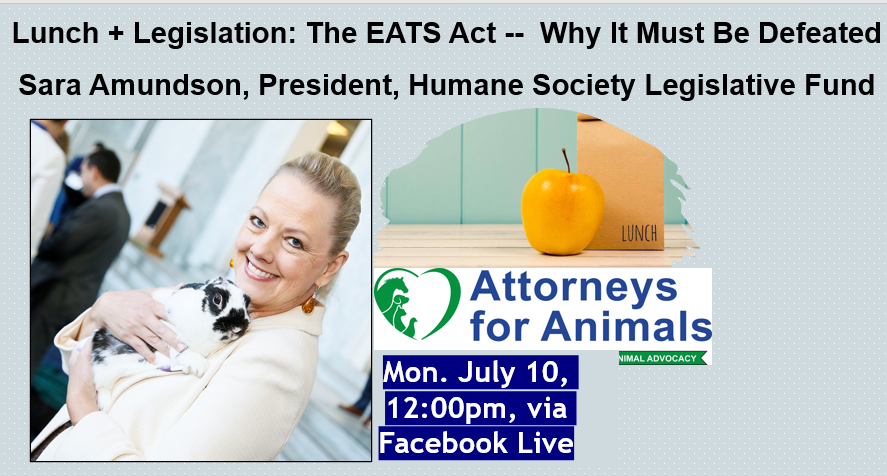ENDING AGRICULTURAL TRADE SUPPRESSION or EATS Act, poses a significant threat to animal welfare measures passed over the last few decades. Introduced in the wake of the US Supreme Court’s decision in May upholding California’s Prop 12 which ensures minimal housing standards for animals raised for food, and because this is the year that a farm bill is being negotiated, advocates need to pay attention.
It’s been introduced in both the Senate and House and ostensibly aims “to prevent States and local jurisdictions from interfering with the production and distribution of agricultural products in interstate commerce.”
The other thing that’s fascinating about the legislation is what constitutes an “agricultural product”. It could be anything from firewood to pork to puppy mills.
Sara Amundson, HSLF, Lunch + Legislation July 10, 2023
Some highlights of Sara’s presentation (view the entire discussion here):
- The Ending Agricultural Trade Suppression Act, or as I fondly refer to it “The State’s Rights Suppression Act”
- There are upwards of 1000 state laws that could be negatively implicated by this broad, far-reaching piece of legislation.
- It also has one of the craziest and far-reaching causes of action I’ve seen in any federal legislation, basically enabling anyone for any reason with regard to a challenge on an “agricultural product” to file.
- The other thing that’s fascinating about the legislation is what constitutes an “agricultural product”. It could be anything from firewood to pork to puppy mills.
- Bottom line is there’s no one-size-fits-all approach to state legislation. … States need to be able to pass legislation that is fitting their constituents’ considerations and [is] in the best interests of their states.
- When you look at pork production in the United States, two of the largest entities that are household names, Smithfield and JBS, they’re not American owned. They’re owned by the Chinese. This is not protecting American farmers by any stretch.
- Michiganders, make some noise. What is critically important now is keeping your {US representatives) from co-sponsoring the EATS Act. Be mindful of your House delegation. Make sure you are calling your member of the House and ask them not only to not [co-sponsor] now but not get on this highly controversial bill at all. We need to continue to make this as highly controversial as possible.
- All of our energies need to be focused on is [ensuring] the EATS bill is not agreed to behind closed doors, in conference committee. So make sure you make noise with leadership on both sides [and both chambers] because we don’t want to be in a position that they hear from the pork producers and not us.
- The first order of business right now is reach out to .. members of the US House. Keep members [from co-sponsoring] this very dangerous bill. And then in contacting Stabenow, tell her how much you appreciate her and that you’ll be watching. And you expect her to be the thin blue line that prevents this from getting folded in to the final bill.

